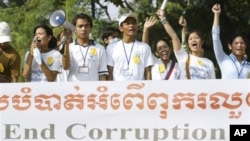PHNOM PENH —
Cambodia losses about 10 percent of GDP, or $1.7 billion annually, to corruption, according to a report release on Wednesday by International Labor Organization.
Farid Hegazy, a senior economist at the ILO who led the research, said Wednesday that chronic corruption is threatening the business environment in Cambodia.
“Corruption is the most hindering business constraint,” he said. “It is estimated that 10 percent of GDP is annually lost to it. Despite steady improvements in public financial management since 2002, about 30 percent of firms still believe that policymaking is controlled by individuals with personal connections to leaders in government.”
The report’s findings were based on information from 355 different companies and interviews with 257 workers. Companies claimed they spent nearly 9 percent of sales to bribery in 2008, a 3.5 percent increase from 2003. At least a third of these companies took no action.
Corruption and bribery were associated with low government salaries, as well as poor accountability and law enforcement, the report says.
A second report released Wednesday, by the Cambodian Federation of Employers and Business Associations, found similar results in corruption, which led to delayed or failed services. The Camfeba report cited a lack of transparency in the judicial process that put companies at high risk.
Labor Minister Ith Sam Heng said Wednesday that government policy must move toward transparency in the investment environment.
Both reports called for a strengthening of legal enforcement of anti-corruption laws, as well as a reformed judicial system and transparency in public bidding.
Farid Hegazy, a senior economist at the ILO who led the research, said Wednesday that chronic corruption is threatening the business environment in Cambodia.
“Corruption is the most hindering business constraint,” he said. “It is estimated that 10 percent of GDP is annually lost to it. Despite steady improvements in public financial management since 2002, about 30 percent of firms still believe that policymaking is controlled by individuals with personal connections to leaders in government.”
The report’s findings were based on information from 355 different companies and interviews with 257 workers. Companies claimed they spent nearly 9 percent of sales to bribery in 2008, a 3.5 percent increase from 2003. At least a third of these companies took no action.
Corruption and bribery were associated with low government salaries, as well as poor accountability and law enforcement, the report says.
A second report released Wednesday, by the Cambodian Federation of Employers and Business Associations, found similar results in corruption, which led to delayed or failed services. The Camfeba report cited a lack of transparency in the judicial process that put companies at high risk.
Labor Minister Ith Sam Heng said Wednesday that government policy must move toward transparency in the investment environment.
Both reports called for a strengthening of legal enforcement of anti-corruption laws, as well as a reformed judicial system and transparency in public bidding.







